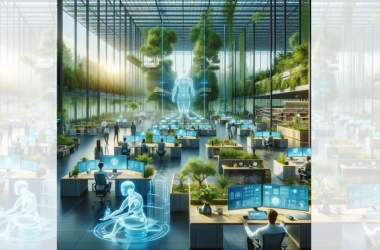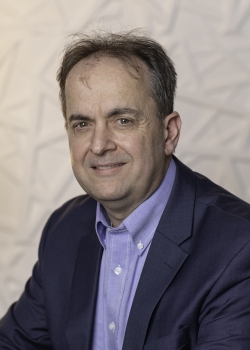Wittenborg Professor Explores Future of AI Integration in the Workplace

Dr Gabor Molnar and Co-authors Explore Need for Human-Centric AI Integration in HRM
In a world where manning tables once dictated workforce management, a new era is dawning. Artificial Intelligence (AI) is revolutionising Human Resource Management (HRM) as we know it. No longer confined to old-school methods, AI is reshaping HRM functions, driving efficiency and data analysis.
To explore the role of HR in the age of AI, Associate Professor of Applied Sciences at Wittenborg, Dr Gabor Molnar, alongside co-authors Ali Fenwick and Piper Frangos, have published a paper to explore the need for a human-centric approach in integrating AI within organisations.
"Our paper titled 'Revisiting the role of HR in the age of AI: bringing humans and machines closer together in the workplace' has significant implications for the industry, particularly for organisations aiming to leverage AI at the workplace," Molnar said of the paper, published in January 2024 by Frontiers, one of the most cited research publishers and open science platforms. "My co-authors and I have received several speaking invitations suggesting that the topic is both timely and crucial."
Molnar and his co-authors view AI integration not only as inevitable but also as an opportunity to improve organisational effectiveness and employee well-being.
Until now, AI has remained a significant source of concern for employees in many organisations. Privacy and ethical issues, recruitment bias and questions of "Will AI take my job?" have become common water-cooler talk. However, Molnar and his co-authors argue that by recognising and addressing these challenges proactively, organisations can ensure smoother AI implementation and mitigate potential risks.

Research and discussion
The authors offer a historical overview of the evolving role of HRM, as well as its significance in the age of AI, before outlining strategies for HRM to facilitate closer collaboration between humans and machines in the workplace.
To do this, they group HRM practices into three specific "bundles" where HRM professionals exert their influence: people, culture and compliance.
Their research further offers insights into three phases of AI usage in the workplace, including technocratic, integrated and fully embedded. The initial two phases draw from recent research on AI in HRM. The final phase, their conceptual viewpoint, outlines a logical evolution of AI into the workplace of the future.
In the technocratic phase, AI is used to automate and improve specific HRM functions. The integrated phase prioritises collaboration between AI and humans in daily tasks and personalised employee experiences. Lastly, the fully embedded phase concentrates on managing interactions between humans and AI to enhance the overall human experience and align with broader societal objectives.
Molnar and his co-authors go on to create a roadmap for HRM professionals to navigate each phase, by, for instance, training decision makers on AI functionality or making sure that HRM collaborates with AI developers to ensure user-friendly, intuitive, and responsible AI integration. It is also important to foster innovation, collaboration and effective change management in an organisation.
"HRM professionals can use the guidance provided in the paper to advocate for responsible AI adoption within their organisations, promoting transparency, fairness and inclusivity," Molnar explained. "This could lead to an environment where humans and machines complement each other's strengths and where organisations can unlock greater productivity and innovation potential."
What's more, HRM professionals can leverage this perspective to spearhead initiatives that promote cross-functional collaboration, upskilling, and reskilling efforts to ensure that employees are equipped to thrive in an AI-enabled environment.
WUP 08/04/2024
by Erene Roux
©WUAS Press